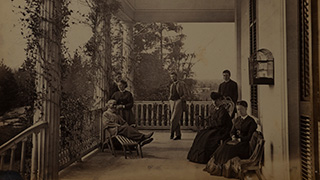Archive of Seton Family Papers Provides New Window Into Saint’s Life
Monday, February 5, 2024

William Seton Sr., Elizabeth, Thomas Jevons, William Jr., Alfred Booth, Isabel, and Lydia Butler. From MSS 0074, Seton Family Scrapbook, Page 43, in the Monsignor William Noe Field Archives and Special Collections Center at Seton Hall University
When Seton Hall recently received a generous donation of Seton family papers from the Sisters of Charity of New York, historians, students of the American Revolution and researchers alike took notice. Facilitated by Professor Thomas Rzeznik of the Department of History, the donation provides rare insight into the lives of the University’s namesake, Elizabeth Ann Seton, her family, and the climate for merchants like the Setons during the Revolutionary War.
The Sisters of Charity is a community of Roman Catholic women founded in 1809 by Seton herself in Emmitsburg, Maryland. Historically, they have honored the spirit of St. Vincent de Paul, St. Louise de Marillac and St. Elizabeth Ann Seton, and their mission includes both charity and stewardship. Thus, the Sisters took meticulous care of the valuable Seton family papers - records from the 18th century - and transcribed them for modern readers.
"These papers, the generous gift of the Sisters of Charity of New York, represent an exciting opportunity for Seton Hall students, faculty, and scholars around the world to learn more about the economic and social history of the Seton family," said Sarah Ponichtera, assistant dean of the Collection Gallery. "These aspects of their life show the forces shaping the world Elizabeth Ann Seton encountered and transformed."
The papers include shipping documents from the Seton family mercantile business, and letters from Elizabeth Ann Seton’s relatives both before and after her lifetime. These papers will be merged with the already-in residence Seton-Jevons papers (letters of Elizabeth Ann Seton’s grandchildren). Prior to this acquisition, Seton Hall did not have writings from earlier periods in the family’s history.
The newly added papers represent correspondence from the late 1700s. Some of the letters written between William Seton, Elizabeth Ann Bayley Seton’s future father-in-law, and his mother, Elizabeth Seton, in 1782-83, provide insight into perspectives on the American Revolution, particularly from the viewpoint of some who did not favor it.
William Seton was a prominent merchant in New York City, and a loyalist among other mid-Atlantic merchants who thought similarly about the British rule. Though others left, Seton stayed in New York City during the war because the city remained under British control. By the spring of 1775, Mr. Seton remained steadfast in his allegiance to King George III.
"William Seton and Elizabeth Seton wrote about conditions in New York City just years after the American Revolution…and this acquisition includes shipping documents from their mercantile business, a potential resource for researchers of maritime international trade with the United States during this period," said Ponichtera.
Sean Harvey, Ph.D., associate professor of History, reviewed the new donation last September. His interest in the collection, he wrote, leaned towards pre-1865 holdings, and he spent time distilling historical information from the vintage papers. From them, and his own extensive scholarly knowledge of the period, he shared details of how William Seton viewed the wartime landscape.
"The British occupation secured the safety of New York loyalists and acted as a magnet for others fleeing wartime violence and rebel governments," he wrote. "It came to an end, however, once the British determined to conclude peace acknowledging U.S. independence. The pending British evacuation left William Seton exposed, vulnerable to retaliation once patriots took control of the city."
William Seton’s direct writings on this precarious moment in history are not present (they would be held as part of his mother’s archive), but his mother’s responses, wrote Harvey, indicate the concerns Seton expressed to her. "She tried to comfort him in December 1782," he added, "noting the opinion in her English circle that "you will have it more in your power than ever to make a large Fortune, as the Americans will be wiser, and more selfish, than to drive Honest industrious People out of their Society."
From this, observed Harvey, a reader of the Seton family papers can surmise how important independence was to someone in William Seton’s position, and sheds light on how strong family bonds were, "despite an ocean-wide separation and the disruption of war and revolution."
The library staff emphasizes that there is still a great deal to explore in the Seton family papers and encourages students and faculty to use these materials in their own research, starting with the Seton family photograph albums, the Seton-Jevons papers, and now, the Seton family papers. The new acquisition will be added to the existing Seton-Jevons finding aid in the coming months.
The Archives & Special Collections is open Mon-Fri from 9 a.m.-5 p.m., and you can make an appointment to visit the archives here.
Categories: Arts and Culture





